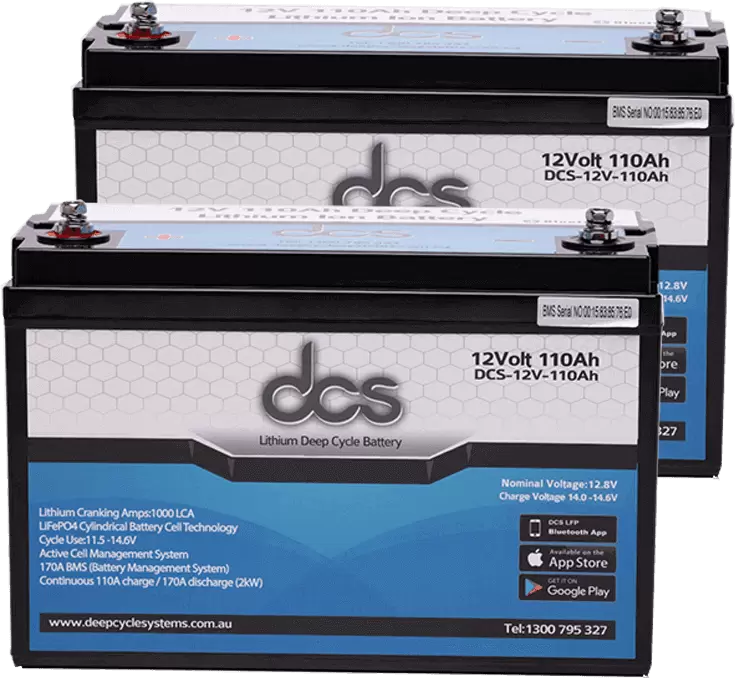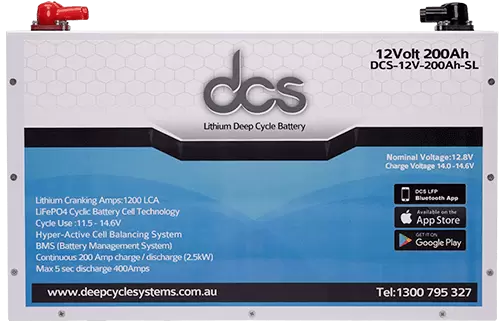Are you looking for a power source that’s reliable and versatile? If so, then 12 volt lithium battery is the perfect choice. In this blog post, we’ll discuss the advantages of using 12V batteries, their various applications, and how to find the right one for your needs. From powering cars and boats to providing backup power for your home or business, 12V batteries offer unparalleled versatility. With the correct information, you can decide which 12V battery is suitable for your situation. So let’s dive in and explore the power of versatility 12V batteries provide!
12 volt deep cycle battery
12 volt deep cycle battery is a type of 12V battery that is designed to deliver a consistent and sustained amount of power over an extended period. Unlike standard car batteries, which are designed to deliver a high burst of energy to start the engine, deep cycle batteries are optimized for long-term use in applications such as boats, RVs, solar power systems, and electric vehicles.
Deep cycle batteries come in various sizes, but they all share some common characteristics. They are typically designed with thicker plates, which can withstand deeper discharges without sustaining damage. They also have a larger electrolyte reserve, which means they can provide more sustained power without needing to be recharged as frequently.
One important consideration when choosing a deep cycle battery is its amp-hour rating. This rating reflects the battery’s capacity to deliver a certain amount of current over a specified period. The higher the amp-hour rating, the longer the battery will last under a given load.
What are 12V batteries and their importance?
12V batteries are a type of battery that provide a power supply at 12 volts. They are commonly used in various automotive, marine, and backup power systems applications. The importance of 12V batteries lies in their versatility and reliability.
In the automotive industry, 12V batteries are the standard power source for vehicles. They provide the necessary energy to start the engine, power the lights and accessories, and maintain the vehicle’s electrical system. Without a functioning 12V battery, a car cannot operate efficiently.
Similarly, 12V batteries play a crucial role in powering boats and other watercraft in the marine industry. They provide the energy required to start the engine, run the navigation lights, and operate other essential electrical systems onboard.
In addition to automotive and marine applications, 12V batteries are widely used in home and business backup power systems. During power outages, they act as a reliable source of electricity, ensuring that essential appliances and devices can continue to function.
The importance of 12V batteries cannot be overstated. They are essential for powering various applications and provide a reliable and versatile power source. Whether you need to start your car, operate your boat, or keep the lights on during a power outage, 12V batteries are the go-to choice for their reliability and versatility.
12v deep cycle battery
12-volt deep cycle battery is a specific type of 12V battery that is designed to discharge at a slower rate over a longer period of time. This makes it ideal for applications such as RVs, boats, and off-grid systems, where consistent and reliable power is needed over an extended period.
Unlike other types of 12V batteries that are used for starting engines and other high-demand applications, deep cycle batteries are built with thicker lead plates and are designed to withstand regular, deep discharges without damaging the battery.
When choosing a 12-volt deep cycle battery, it’s important to consider factors such as the amp hour (Ah) rating, which indicates how much energy the battery can store, and the cycle life, which refers to how many times the battery can be fully discharged and recharged before it needs to be replaced.
Proper maintenance, including regular charging and avoiding over-discharging, can also help extend the lifespan of a 12V deep cycle battery.
Overall, 12V deep cycle batteries offer reliable and consistent power for a wide range of applications, making them a versatile choice for anyone in need of dependable energy storage.
Types of 12V batteries and their applications
12V batteries come in different types, each with unique characteristics and applications. Some of the common types of 12V batteries include:
- Lead-acid batteries are the most common 12V batteries used in automobiles, UPS, and other backup power applications. They are cheap, reliable, and have a long life cycle.
- Lithium-ion batteries: These are relatively new and increasingly popular due to their high energy density, fast charging, and long cycle life. They are commonly used in electric cars, laptops, and other portable devices.
- Nickel-metal hydride batteries are also commonly used in portable devices and toys due to their long cycle life, low self-discharge rate, and high power density.
- Alkaline batteries: These are disposable batteries commonly used in remote controls, toys, and other low-power devices. They are inexpensive, easy to find, and have a long shelf life.
Choosing the correct type of 12V battery for your application is crucial as it can affect the performance and longevity of your device. Consider factors such as power requirements, lifespan, and cost when selecting a 12V battery.
Advantages and disadvantages of 12V batteries
12V batteries offer several advantages and disadvantages that are worth considering before choosing one for your specific needs. One significant advantage of 12V batteries is their versatility. They can power various devices such as car batteries, solar panels, boats, RVs, and many other appliances that require direct current. They are also easy to install and maintain, making them popular among DIY enthusiasts.
Another advantage is that they are more affordable than other types of batteries, making them accessible to many people. However, their affordability comes at the cost of lower energy density, meaning they may not last as long as other batteries and may require frequent recharging.
One disadvantage of 12V batteries is their low capacity, which makes them unsuitable for high-powered applications. They may also have limited cycle life, which refers to the number of times a battery can be discharged and recharged before its capacity degrades.
Despite these disadvantages, 12V batteries remain popular for many due to their versatility, affordability, and ease of use. When choosing a 12V battery, it’s crucial to consider your needs and application carefully to make an informed decision.
How to choose the correct 12V battery for your needs?
When choosing the correct 12V battery for your needs, there are several factors to consider. First and foremost, you’ll want to determine the power requirements of the devices or equipment you plan to power. Consider the voltage and current requirements and any specific recommendations from the manufacturers.
Next, you’ll want to consider the capacity of the battery. The power, measured in amp-hours (Ah), tells you how much energy the battery can store. The higher the degree, the longer the battery will last before recharging. Consider how long you need the battery to run and choose a capacity to meet your needs.
Additionally, consider the size and weight of the battery. A smaller and lighter battery may be more convenient if you plan to use it in a portable application, such as camping or boating. On the other hand, if size and weight are not a concern, you may opt for a larger battery with higher capacity.
It’s also important to consider the battery’s chemistry. Several types of 12V batteries are available, including lead-acid, lithium-ion, and nickel-metal hydride. Each type has its advantages and disadvantages in terms of cost, performance, and lifespan. Research the different battery chemistries to determine which fits your needs and budget best.
Lastly, consider the brand and reputation of the battery. Look for reputable manufacturers with a track record of producing reliable and high-quality batteries. Reading customer reviews and seeking recommendations from experts or friends can also help you choose a trustworthy brand.
By considering these factors, you can choose the correct 12V battery that will meet your power needs and provide reliable performance for years.
Maintaining and extending the lifespan of 12V batteries
One of the critical factors in maximizing the life of your 12V battery is proper maintenance. Here are some tips to help develop the lifespan of your 12V battery:
- Keep the battery clean: Dirt and debris can build up on the battery terminals, which can cause corrosion and other damage. Regularly cleaning the battery can help prevent this.
- Check the water level: Some 12V batteries require periodic water additions. Check the water level regularly and add distilled water as needed.
- Keep the battery charged: Leaving the battery discharged for extended periods of time can damage it. If you’re not using the battery regularly, consider using a battery maintainer to keep it charged.
- Avoid overcharging: Overcharging can cause the battery to overheat, which can damage the internal components. Use a charger that’s designed for your battery and follow the manufacturer’s instructions carefully.
- Store the battery properly: If you’re storing your 12V battery for an extended period of time, it’s essential to keep it in a cool, dry place away from direct sunlight.
By following these simple maintenance tips, you can help extend the lifespan of your 12V battery and ensure that it’s ready when you need it.
Common misconceptions about 12V batteries
There are a few common misconceptions about 12V batteries that need to be addressed. Firstly, many people assume that all 12V batteries are the same, when in fact there are a variety of types with different capacities and characteristics. It’s essential to choose the right kind of battery for your needs, whether that’s a deep cycle battery for powering appliances on a camping trip or a starter battery for your car.
Another common misconception is that 12V batteries are dangerous and can explode. While it’s true that storms can be hazardous if mishandled, there’s no reason to be afraid of 12V batteries as long as you follow basic safety precautions and handle them properly.
Lastly, some people think that 12V batteries are expensive and difficult to maintain. While it’s true that some types of batteries can be more costly than others, there are plenty of affordable options available. Additionally, with proper maintenance, 12V batteries can last for years and provide reliable power for a wide range of applications.
FAQs
Q: Are 12V batteries the only option for powering my electronics and devices?
A: No, there are other types of batteries such as lithium-ion, lead-acid, and nickel-metal hydride. However, 12V batteries are a popular choice due to their versatility and availability.
Q: Can I charge a 12V battery with a regular car battery charger?
A: Yes, you can. However, it is recommended to use a charger that is specifically designed for 12V batteries to avoid overcharging and damaging the battery.
Q: How long do 12V batteries last?
A: The lifespan of a 12V battery depends on various factors such as the type of battery, usage, and maintenance. On average, a 12V battery can last anywhere from 2-7 years.
Conclusion
In conclusion, 12V batteries are an incredibly versatile and reliable power source that can be used in a wide range of applications. Whether you need to power your car, boat, RV, or even your home or business, 12V batteries offer the flexibility and convenience you need. Throughout this blog post, we have discussed the importance of 12V batteries, their various applications, and the advantages they offer. We have also addressed common misconceptions about 12V batteries and provided tips on how to choose the right one for your needs and extend its lifespan through proper maintenance.
| Other Good Articles to Read |
| Blogs-Nation |
| Blogs-Peoples |
| Bryan Smith Blogs |
| Intellect Blogs |
| The Fault In Our Blogs |
| Blogs Eu |
| Oz Forums |
| Recruitment Blogs |
| Zet Blogs |
| Blogs Tudiolegale |
| Blogs Map |

